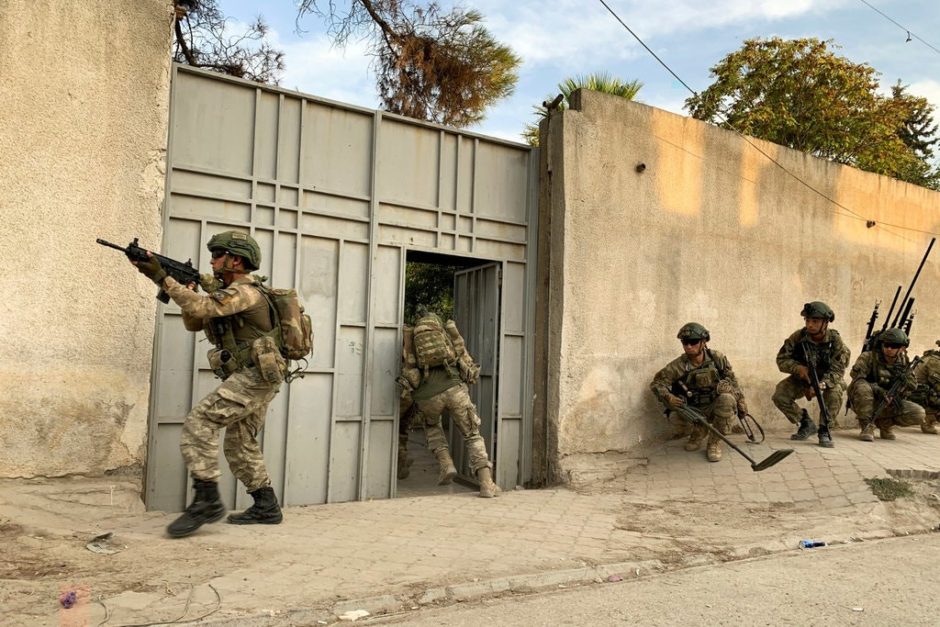Donald Trump hailed it as “an incredible outcome,” alluding to the U.S.-sponsored ceasefire that appears to have ended the fighting between the Turkish army and the Syrian Kurds in a broad swath of northern Syria.
Trump’s self-serving analysis of the truce, brokered by U.S. Vice-President Mike Pence in a meeting with Turkish President Recep Tayyip Erdogan about a week after Turkey invaded Syria, fits in seamlessly with his insular view that the United States has no national security interests to defend there.
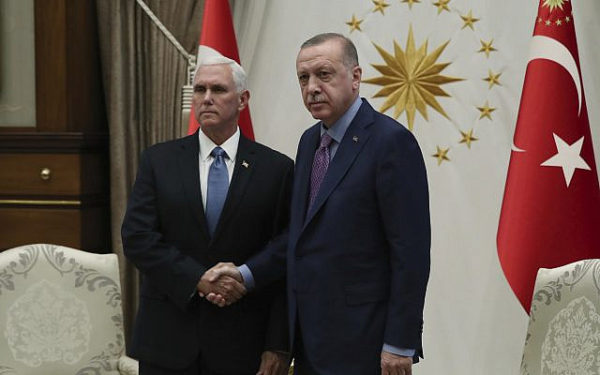
“That has nothing to do with us,” he declared blithely, upending U.S. policy in the region and leaving a raft of unanswered questions.
Having promised to extricate the United States from “endless wars” in the Middle East, Trump said dismissively of Turkey and the Kurds, “Let them fight their own wars. They’ve been fighting for 1,000 years. Let them fight their own wars.”
Yesterday, after Turkey stopped its offensive and Trump lifted the economic sanctions he had imposed on Turkey following its incursion into Syria, he doubled down on this theme.
“Turkey, Syria and all forms of the Kurds have been fighting for centuries,” he said. “We have done them a great service and we’ve done a great job for all of them. And now, we’re getting out. Let someone else fight over this long bloodstained sand.”
So in one fell swoop, Trump abandoned the Kurds, leaving them at the mercy of Turkey and its Syrian Arab allies. In the process, he ceded Rojava — the Kurdish semi-autonomous area immediately south of the Turkish border that comprises 25 percent of Syrian territory — to Turkey, Russia and Syria.
The day before, with the U.S. ceasefire holding up despite a few minor skirmishes, Erdogan and Russian President Vladimir Putin agreed to take control of Rojava, thereby consigning the Kurdish enclave the United States had supported to the dustbin of history.
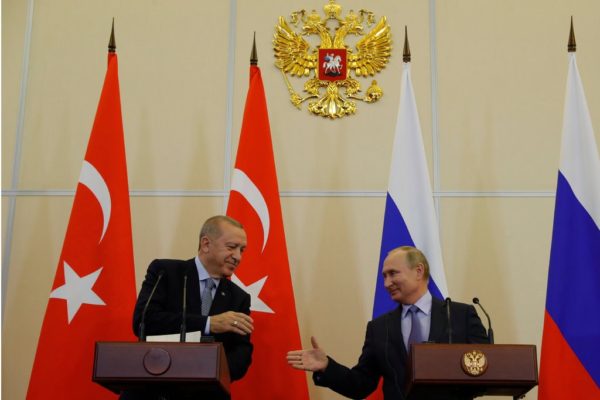
Under the agreement, tacitly endorsed by the Trump administration, Kurds from the Syrian Democratic Forces were to retreat 2o miles away from the Turkish border, while Turkey and Russia would jointly patrol a buffer zone 75 miles in length and 20 miles deep, far out of reach of Kurdish mortar fire.
The upshot of all these arrangements spell victory for Turkey, Russia and Syria and defeat for the Kurds, the largest minority group in the Middle East still bereft of statehood.
Turkey, which had long sought to snuff out Rojava, conquered 900 square miles of Syrian territory and more or less got what it wanted without having to prolong its invasion: a buffer zone swept clean of Kurdish forces it considered a clear and present threat to its security. Turkey hopes to resettle three million Syrian refugees in this area, but it will have to share Rojava with Russia and Syria. This, however, is a small price for Erdogan to pay. How long he intends to keep his forces in Syria is an open question.
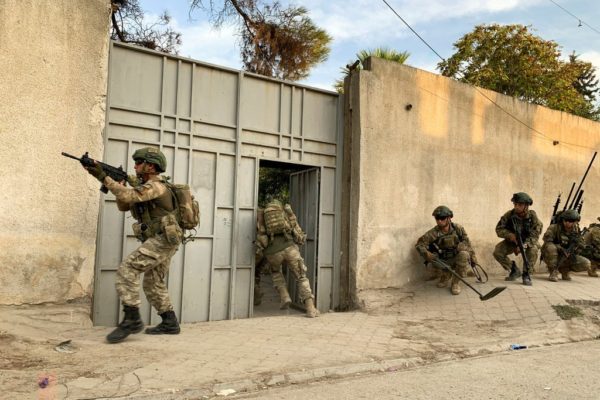
Thanks to Trump’s decision to unilaterally withdraw most of the 1,000 U.S. troops in Syria — a Russian client state which has been bogged down in a civil war since 2011 — Russia has virtually cleared American forces from Syria. They were deployed there in 2014 after the Islamic State organization captured one-third of Syria’s land mass.
Unlike the United States, Russia — which has been steadily expanding its influence in the Middle East for the past few years — has shown itself to be a reliable and steadfast ally.
Syria, having dispatched its own forces to Rojava, has taken yet another step toward reclaiming territory it lost in the first years of the civil war. Syrian President Bashar Al-Assad can thank Trump for his success in consolidating his grip over this part of his country.
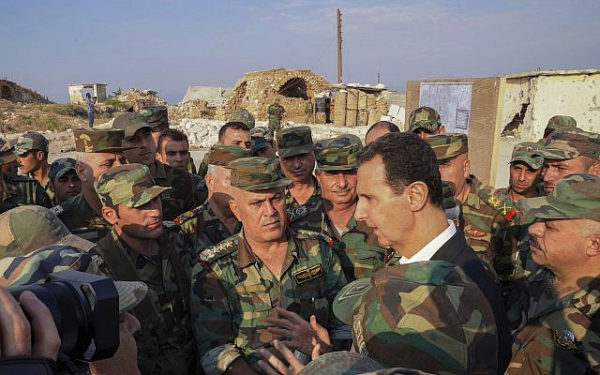
As a result, Iran — Israel’s arch enemy and Syria’s ally — is better positioned to entrench itself militarily in Syria.
Trump’s disengagement from Syria also means that Islamic State, battered by the United States and the Kurds in a succession of hard-fought battles in which U.S. air power turned the tide, can regroup and wreak havoc on the region yet again.
It remains to be seen whether Turkey, Russia and Syria will pursue the war against Islamic State with the same vigor and zeal as the United States and the Kurds.
With Turkey Russia and Syria having seized control of Rojava, the United States will continue pulling its remaining troops out of Syria. The majority of them will be transferred to neighboring Iraq, where Islamic State originated. As U.S. military convoys headed toward the Iraqi border this week, they were pelted with potatoes and rocks by Kurds, who felt betrayed by Trump’s volte-face.
According to an announcement Trump issued on October 21, a small contingent of U.S. forces, 200 to 300 troops, will stay behind in northeastern Syria for the foreseeable future. They will guard oil fields the Kurds had protected from Islamic State attacks and maintain the Al-Tanf garrison in south-central Syria, which lies astride a land corridor the Iranian government wants to build from Iran to the Mediterranean Sea to ferry supplies to its allies in Syria and Lebanon.
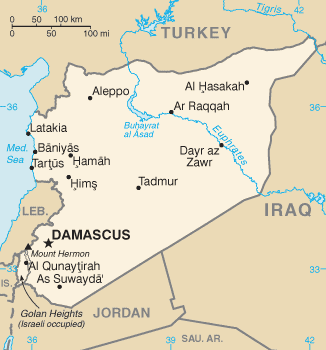
Israel is pleased that the Al-Tanf base will be kept intact, but is skeptical of Trump’s withdrawal from the rest of Syria and his staying power. Prior to the latest developments, he effusively praised his Kurdish allies in Syria. But having left them to their own devices after tacitly allowing Turkey to invade Rojava, Trump quickly downgraded their status and claimed they were “no angels.”
With one single stroke, Trump has undermined American credibility among U.S. allies, bolstered Russia’s position in the Middle East, strengthened the Syrian regime in Damascus, emboldened Iran — which has been subjected to an American campaign of “maximum pressure” in the past year for so — and reinvigorated Islamic State.
Contradicting Trump’s rosy appraisal of recent events, U.S. Defence Secretary Mark Esper said on October 24 that Turkey’s “unwarranted” invasion of Syria has jeopardized gains made there by the United States and allied Syrian Kurdish forces battling Islamic State.
It’s quite an indictment of a sitting U.S. president.
